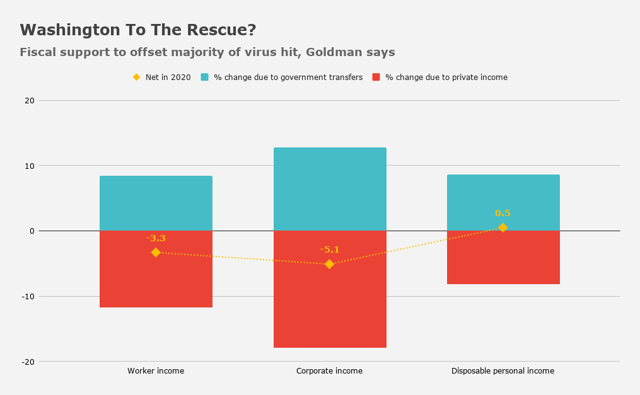It looks like you're new here. If you want to get involved, click one of these buttons!
For years, commentators of a conspiratorial lean have half-jokingly suggested that humanity is living in a simulation, à la The Matrix. When it comes to economic activity and markets, that is no longer an absurd suggestion.
...around three-quarters of those laid-off workers "receive benefits that exceed their former wage," Goldman says.
Goldman's projections actually call for a small increase in disposable personal income.

But there is a problem related to living in a simulation:Again, we are living in a simulation.
Another thread of the article discussess Modern Monetary Theory and ties it into current Fed and Treasury activities. Here is a sample:The Treasury can make up for people’s lost wages, but people need the things wages buy. So replacing lost wages and revenues will not be enough for long: the economy has to produce goods and services.
Here is the link to the article:The US can always buy whatever there is to buy that's denominated in US dollars. It has no need to borrow dollars from anyone else because it is the issuer of those dollars. The US can spend too much, which risks stoking inflation, but the US does not, will not, and has never, needed to borrow dollars. Suggesting otherwise is to traffic in patent nonsense.
Why do governments sell bonds whenever they run deficits?...By selling bonds, they maintain the illusion of being financially constrained.
© 2015 Mutual Fund Observer. All rights reserved.
© 2015 Mutual Fund Observer. All rights reserved. Powered by Vanilla
Comments
Here's one: Places like Amazon and Walmart worked because tax-payers paid for everything the employer wasn't. Like . . . Food Stamps. And . . . Medicaid. Maybe throw in some Section 8 housing.
So who is going to get taxed to give money to people to buy the stuff those companies are selling? And those companies don't even make the stuff they sell. Will manufacturers, where ever they are, continue to make stuff for funny money?
It's not a simulation. It's musical chairs. Except a lot of chairs are going to be taken away all at once.